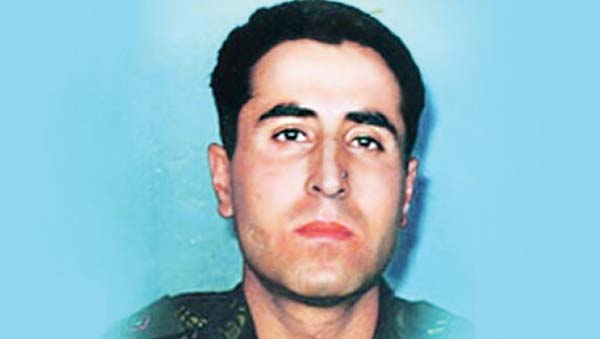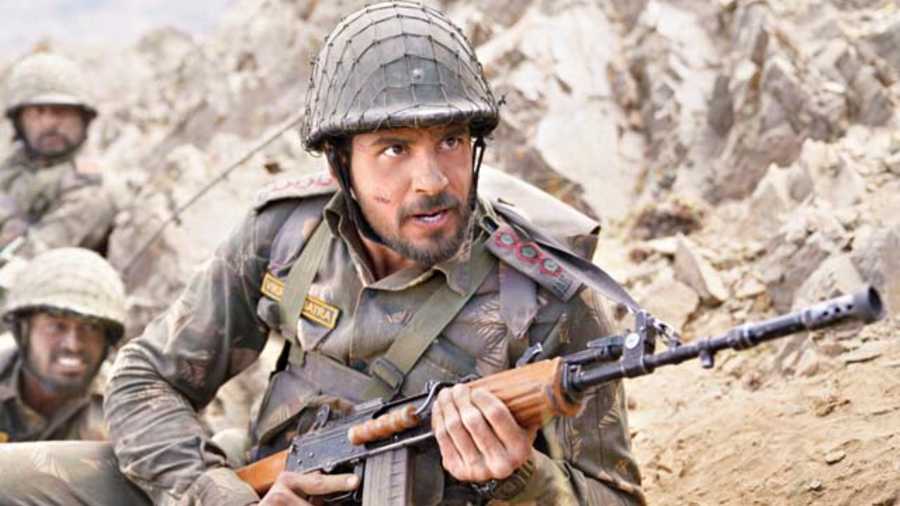For the first time in his nearly decade-long career, Sidharth Malhotra plays a real-life character. Shershaah — streaming on Amazon Prime Video from August 12 — has the handsome actor slipping into the uniform of braveheart Vikram Batra, whose name has gone down in the annals of history after being martyred in the 1999 Kargil War.
Directed by Vishnuvardhan, Shershaah (which was Batra’s code name on the battlefield) also stars Kiara Advani. Over a Zoom call, The Telegraph caught up with Sidharth for a chat on the responsibility of playing a war hero and how he’s grown in the 10 years he’s been in the movie business.
As an actor, a person and as an Indian, how important is it for you to bring Vikram Batra’s story to screen?
It’s a very big responsibility to play a real-life character, and that too such a heroic character like Vikram Batra. I feel it’s important for everyone to see Captain Vikram Batra’s story, especially the youth. In some sort of subtext and without spelling it out so blatantly, this story is definitely an inspiration for the youth.
Vikram Batra gave up his life at 24, which is a very, very young age. I would like to tell all those who are in their early 20s that find that one thing you are so passionate about and are driven by — if you are passionate about the armed forces, then join them — but even otherwise, find that one thing that drives your life, and that is something that Vikram Batra did. He did it to the extent that he gave up his life for it.
It’s a very, very special story for me. It’s kind of a passion project I would say because it’s taken a long time to make. I am very eager to know what Vikram Batra’s family thinks once they have seen the film.
What were you like in your early 20s? Did you have a passion that you had started working towards or were you still finding your way?
I was already in Mumbai at that time, struggling as an actor (smiles). There was a sense of passion, but maybe not an outcome. I was on that path, and today I am lucky that I have found my calling as an actor. I came here at 19 and I was about 24 when I started working as an assistant director (on Karan Johar’s My Name is Khan). That, for me, was the best film school. So yes, I was on the path of working on my passion, but it’s such a volatile profession that you have to keep at it. So yes, I was somewhat on that path of working towards my passion of becoming an actor some day.

Captain Vikram Batra Sourced by the correspondent
Growing up in the ’90s, we had all heard of Vikram Batra and his heroics in the Kargil War. What were your initial impressions of him and how did they change while playing him?
During the Kargil War of 1999, I was hardly 13. It was India’s first ‘televised’ battle in that sense, and I remember watching and hearing the news while growing up in Delhi. I remember having this slight jhalak of this gentleman called Vikram Batra on TV, and he was giving this interview to Barkha (Dutt)... this guy sitting in this tent. I have a very vague memory of it.
And now, more than 20 years later, it all feels so surreal. First that I became an actor and second, that I am playing that character and recreating that same conversation that I had heard on TV as a teenager. So yes, it’s very surreal and through this film, I have realised once more that there is so much to see and appreciate about the armed forces.
My grandfather was in the army. He was a major, he fought the Indo-China War (in 1962). He did get injured and I was very young when he passed away. There is that history for me personally as well.
And now, to see it very closely is special. I am an army fan for life. Those in the forces are just not saying dialogues like us, they are the real heroes. They are living by what they believe in and actually walking the talk. The sacrifices they make, the physical and mental training they undergo... they are on call and they are trained to protect and kill. It’s a very different psyche. Sitting in our homes, we know them from articles and news snippets, but after watching this film, I am hoping people have more respect and interest in those articles... that there was firing at the border and ‘X’ number of soldiers passed away. It’s someone’s life and it’s a very tough life.... It’s been a big learning experience for me, an experience which is filled with love, respect and gratitude for all our armed forces.
Playing a real-life character comes with a lot of responsibility, and this one is a war hero. I remember you telling me the last time we met that meeting the Batra family brought in some pressure. How did you navigate that?
I haven’t ever looked at this film from a commercial point of view. I have met the family multiple times, whether it’s Vikram’s identical twin brother Vishal or his parents and sisters. It really hit me when I went to Palampur to meet them in their house. On the first floor, they have made a lovely museum with all his belongings, his camera, his diaries, his clothes, his medals.... It was very emotional.
I felt more connected to the family because, to be honest, this could be my family, you know. I come from a middle-class Punjabi household as well. Vikram’s parents were schoolteachers and I also hail from a simple family. Vishal is a banker, my brother is a banker. We are culturally very similar and it dawned upon me that this could be my brother or my cousin. And that’s when I felt that this has to be looked at or dealt with in a far more sensitive way. I was extremely focused to do something special for this as an actor. I didn’t want to go overboard or play it too subtle... I wanted to give this the right mix of emotions. There had to be a real, believable factor in the storytelling. I am still very nervous because the family hasn’t seen the film. I hope they like the way their son has been portrayed.
The physical challenges of playing this role are apparent. One just has to watch the trailer to know and I remember you telling me about how you shot the film in sub-zero temperatures in Kargil, dangling from steep rock faces. What was the emotional state of mind that was needed to become this hero?
Captain Vikram Batra was someone who overcame his fears with huge courage and confidence. On the battlefield, after he accomplished his first mission, he told his seniors, ‘Yeh dil maange more, sir!’ He was just 24, he was at 16,000ft, sitting on top of a rock... uncomfortable, possibly dehydrated, oxygen level is less, heart is pumping... and then to precisely fire and kill the enemy and then say, ‘Yeh dil maange more!’ It needs an incredible psyche. I would be lying if I say I completely get it because none of us know what it takes to actually be there in those tough conditions.
But shooting this film in Kargil, spending time with the army and living that life, a gang of boys staying in the same hotel, doing this trek to location every day because cars couldn’t go up there, feeling breathless during action sequences.... We would invariably consume a lot of dust while shooting, my voice texture on the battlefield is actually very different, and that’s something we have kept as is, I haven’t dubbed for it because I wanted to keep it very authentic.
Shooting in Kargil was a once-in-a-lifetime experience for me. No other film has been shot at those heights. The battle scenes, I feel, have been done in a very fresh and authentic way. Even the camerawork is almost handheld, we had the cameras up-close. The wind is too strong and we didn’t have the option of having massive set-ups there. Sometimes, pieces of rock would fall on the crew. It was a very tough location to shoot in. We shot at about 12,000-14,000ft above sea level, trying to recreate very rigorous action set pieces. If you fall, you could hurt yourself badly because everything around has very sharp edges. One slip and an actor could just be gone... we had no protection for anyone falling off a mountain! It gave us a taste of what it would be to be a soldier there. We had the option of retakes, these heroes have only one take in life. I am just in awe of what the army does for us, every day.
I know Shershaah must have been sold to Amazon Prime Video a while ago, but theatres are opening up again across the country. Given the scale of the film and the huge action set pieces, does it rankle somewhere that this could have been watched on the big screen? Or do you think the big heart that the film has makes up for it? And I guess I have answered the question myself!
Ya, I was just going to say that! (Laughs out loud) But yes, we shot the film two-and-a-half years ago. The way it’s shot... it’s massive. The landscape of Kargil... huge mountains, chopper shots and everything has been created to get that immersive experience in a theatre and feel that you are actually there. But, worldwide, the times are very different. It still isn’t safe out there.
We were ready to come out in theatres last July. It’s something that one has to come to terms with, at least in the current situation. But coming on a streaming platform gives me huge exposure as an actor, something which I would not have got if it had released in theatres. But I grew up on theatres, I was launched in a big theatrical release and this is just a bumpy road. Cinemas will be back soon.
Next year marks 10 years since the release of Student of the Year. What have been your biggest takeaways from your time in the movies?
I would replace Student of the Year and call myself ‘Student of Bollywood’. When I came in, I was so unaware and naive... I had no idea of the whole system of the film business. It was very overwhelming for me initially. In fact, it was too much for me. I can now say that I am much more settled. In the last few years, I have become far more passionate about my movies and the roles I am doing. I think it’s very important for an actor to be driven emotionally. It took me a while to learn what goes on behind the camera.
A person coming from outside... you can be trained about how to give a shot, how to look physically, how to say your dialogues... and I thought that was it. But in these nine years, I have realised there is so much more, and it did take me a while to find my feet. So ‘Student of Bollywood’ is basically my journey (smiles).
I am looking forward to Shershaah, Thank God (with Ajay Devgn and Rakul Preet Singh) and Mission Majnu (opposite Rashmika Mandanna), which I feel are films I am more attached to than I was to my films in my earlier years.










